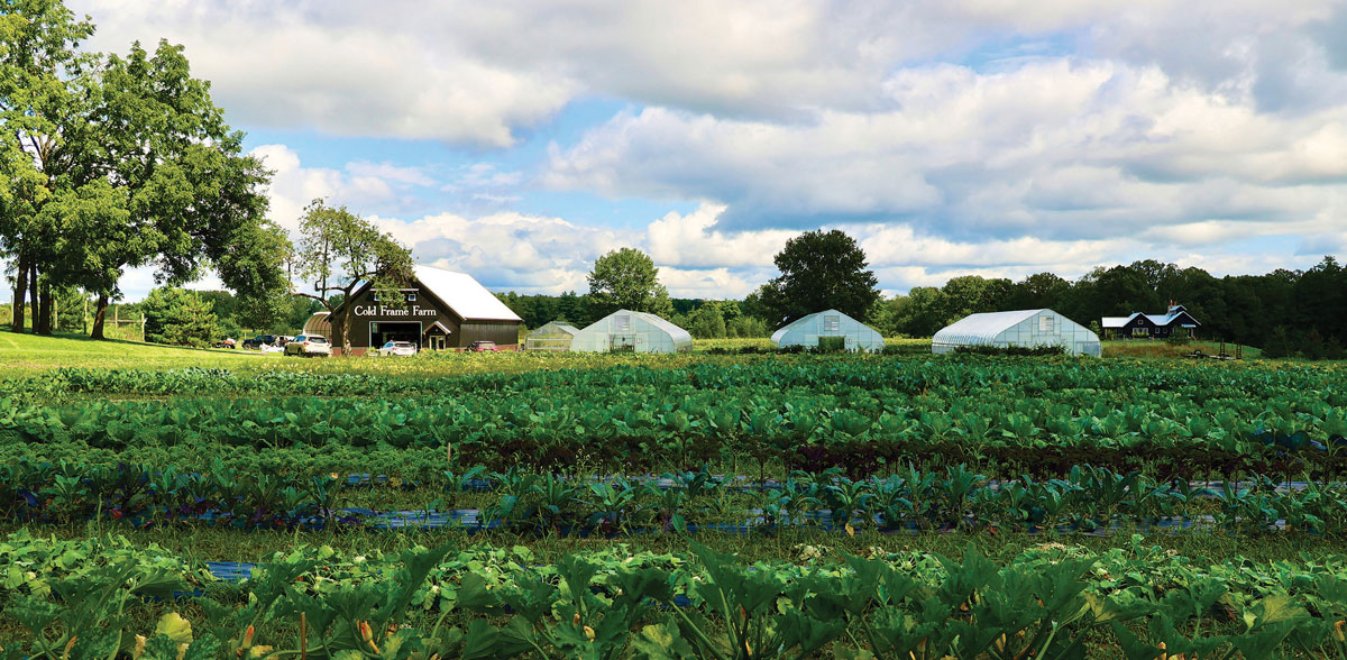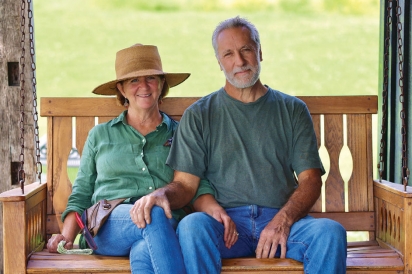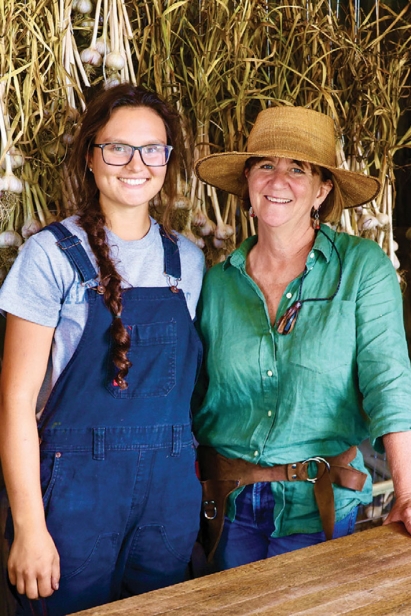Farm Therapy
Filling a Hunger for Healthy Food and Human Connection at Cold Frame Farm
ON THE OUTSKIRTS of Romeo, tucked away along a quiet dirt road, a little farm has settled in and found its home. It’s a welcome sight, so close to busy Van Dyke, and the words atop the barn out front seem to beckon: Cold Frame Farm.
Owner Lisa Jaroch envisioned a farm like this for a long time. Her contentment is evident as she sits stroking her cat, looking at the beauty that surrounds her: bunches of pungent garlic drying overhead, freshly harvested onions on the counter, neat rows of salad greens and various vegetables out front and bright sunflowers swaying in the distance.
“I remember reading the Little House on the Prairie books as a child, dreaming about what that would be like,” she says. That idea of having a small homestead stayed with her.
Eleven years ago, she and her husband, Matt, purchased 27 acres that was once a fruit orchard, owned by one of the earliest settlers of Romeo. It is prime agricultural land, she says, with good soil and drainage.
She had been working as a landscape architect for a prestigious architecture firm in Detroit, but the long drive to the city gave her time to think about a different way of life.
“My husband said, ‘You’ve always talked about doing something like this. You might as well live your dream.’”
Jaroch enrolled in the immersive Organic Farmer Training Program at Michigan State University and learned organic farming techniques at its Student Organic Farm. She gained hands-on experience growing a variety of crops, learned about high tunnels for season extension and the extensive record-keeping that organic certification requires.
“When we were kids, our parents were into ‘natural’: They grew gardens and canned, went to farmers markets, bought half cows, went to the food co-op,” she says. “We had the recognition that a lot of the stuff at the grocery store contained chemicals. It’s a problem, and it made sense to me to not use chemicals.”
Every season thereafter, Jaroch’s dream has been unfolding. Her farm is recognized as Certified Organic by the Ohio Ecological Food and Farming Association and is environmentally verified by the Michigan Agriculture Environmental Assurance Program.
Currently, she farms three acres of the land, leaving space for the coyotes, foxes and deer, using intensive methods like trellising and “forcing” fruit so production per acre is high. She continually replants crops for near-constant production during the season and chooses particular varieties based on flavor. If something works well for the climate and soil, they stick with it, she says.
What is a cold frame?
Named after a horticultural structure that dates back to ancient Rome to extend growing seasons, Cold Frame Farm actually uses hoop houses (or high tunnels), which employ plastic rather than the glass of many traditional cold frames, to help protect plants from extreme weather and pests and to improve soil quality.
Cold Frame Farm partners with students at Oakland University to research local wildflowers, berries and pollinator species. “It’s a delight to talk to the young folk and learn alongside them.”
“It’s about quality of life. Farming is hard and people need to make money, but it’s not easy. It’s labor intensive and the pay is not commensurate with the work. You need to enjoy what you are doing.”
Five popular Detroit restaurants seek out Jaroch’s high-quality, fresh, flavorful produce, including Selden Standard, San Morello, SheWolf, Marrow and Mink. Some restaurant favorites are the heirloom tomatoes, freshly harvested beets, carrots and garlic.
“We are known for our garlic. We grow over 3,000 bulbs easily. We’ve learned that most Americans want large cloves, so we grow a nice variety of flavors, and people have their favorites.”
Additionally, she supports 37 community-supported agriculture (CSA) harvest subscription members with a weekly box of produce throughout the growing season. Demand is so high that she has 175 people on the wait list, but she notes that bigger is not always better.
“There is something therapeutic about this place, the dirt, the land, the connection.”
“It’s about quality of life. Farming is hard and people need to make money, but it’s not easy. It’s labor intensive and the pay is not commensurate with the work. You need to enjoy what you are doing.”
On Fridays and Saturdays from April to December, Jaroch opens the doors to her market store, selling fresh produce, eggs, honey and other locally made items, like soap, candles and maple syrup. She also sells a small amount of meat birds, chickens and turkeys, available only by pre-order.
For the lucky few who get there early, she offers freshly baked baguettes, which typically sell out in 15 minutes. Jaroch, a former baker, makes them herself. When her husband retires in a few years, they may expand that part of the business, she says.
She describes three employees who work alongside her on the farm—Emma Gilliam, Lauren Argiri, Ben Malian—as the backbone of the operation.
“I couldn’t do this alone. Without a good team, you can’t do it. It’s like a ballgame. You have to have all the right players.”
The farm is also known for its flowers, especially peonies and dahlias, sold in beautiful bouquets, wholesale buckets or as part of a weekly Flower CSA. “We get drunk on flowers,” she says.
Jaroch has hosted two weddings on the farm this year, creating a lovely, simple venue with a small chapel in an old silo, surrounded by farm flowers.
“It’s not our desire to be a big wedding venue. We’re doing it because it should be a celebration and enjoyable, and beautiful. Weddings are intense and I’m still trying to figure that out without losing my mind,” she laughs, adding: “We’re not looking to make a million dollars.”
Growing healthy food and educating people about healthy food is where her passion lies.
“I tell my staff, ‘When you talk to customers, share your story. Educate people about why the food is good for you. It’s fresh, has nutritional value. Everything has a medicinal quality.’ The farm is a way to connect people with healthy food and healthy human connections. It’s a ministry, in a way,” Jaroch says.
“This really has been a very wonderful journey for us. I have met some amazing people, just talking to them, getting to know them. They are passionate about what we are doing here.”
“One thing I didn’t really realize is that people were so hungry for connection. There is something therapeutic about this place, the dirt, the land, the connection. It has been the most delightful surprise, getting to know all of these wonderful friends who tell me that what I’m doing really matters, that it’s making a difference. It motivates you when you get feedback from people, even though the work is hard. It somehow feeds your soul.”
Cold Frame Farm
72200 Campground Rd., Romeo;
market store operates 10am–3pm
Fridays and Saturdays, April–December;
810-602-9580; coldframe-farm.com
Janice Benson is a freelance writer and executive director for the Michigan Agritourism Association.









